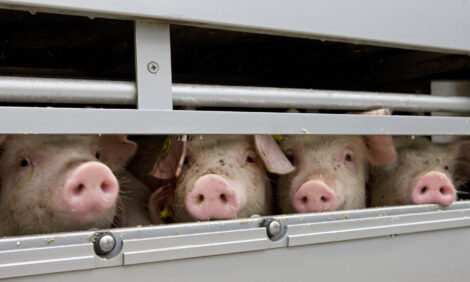



Fines Can Lead to Safer Meat, Says WUR Researcher
NETHERLANDS - Fines farmers for pig carcass condemnation has been successful to reduce the liver worms but it would not be so effective in cases where antibiotic residues are discovered.If the butcher imposes a fine on pork suppliers, food safety can be improved. This, however, does not always get the required results, contended LEI (part of Wageningen UR) employee, Coen van Wagenberg, in his PhD research.
A penalty system works fine for liver disorders in pigs caused by worm infestation. Pigs with a liver disorder are rejected by the abattoir and have to be eradicated. This is costly. Before 2005, pig farmers took out a collective insurance policy. At that time, eight to 10 per cent of the pigs had a liver disorder. Since then, this insurance has been replaced by a penalty regulation: the farmer gets one euro less for a pig with liver disorder. The number of rejects has gone down to four per cent.
Deduction
Mr van Wagenberg said: "It is essential to state this fine as a deduction on the receipt. This gives the pig farmer the idea that he is leaving money behind."
A major condition is that the fine remains low, as he explains: "Otherwise, the pig farmer will go to another butcher," and that the farmer can control the problem. In the case of a liver disorder, this is simple: he can give the pigs an anti-worm medicine.
Antibiotics
If antibiotics are used, a system of fines is less effective. Pig farmers have to inform the butcher that antibiotics have been given in the two months prior to the slaughter. This legislation is imposed by the EU, which does not want antibiotic residues in meat. The abattoirs also inspect the meat for residues.
When Mr van Wagenberg placed the two sets of data side by side, he discovered many differences. In the cases when antibiotic residues were found in the meat, 90 per cent of the farmers had declared that no antibiotics were used.
By accident
Mr van Wagenberg points out, however, that antibiotics can also end up by accident in pigs ready for slaughtering. But the fact remains that the information provided by pig farmers is unreliable. Imposing a penalty on misinformation defeats the purpose, he says. A penalty system based on monitoring in the abattoir can result in fewer pigs with antibiotic residues and better food safety.
He carried out his research at VION, which currently uses the information from pig farmers in another way. If the butcher comes across antibiotics, he will talk this over with the pig farmer.
"As a result, the farmer will critically review his management system. If these problems persist, the butcher can bar the farmer from supplying. They are in the process of doing this now," concluded Mr van Wagenburg.
Mr van Wagenberg defended his PhD thesis on 3 November under Professor Bert Urlings (Professor of Supply Chain Management in Animal Production at Wageningen University, and director of quality management at VION) and Professor Jack van der Vorst (Professor of Logistics and Operations Research at Wageningen University).








